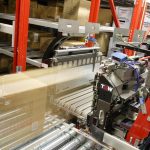This week, the World Economic Forum (WEF) released a report stating that in the coming years, robots and AI will replace 75 million jobs globally. At first, this is due to four specific technological advances ”ubiquitous high-speed mobile internet; artificial intelligence; widespread adoption of big data analytics; and cloud technology. By 2022, thanks to smart algorithms and … [Read more...] about Why Robots Will Require Governments and Organisations to Adapt
Robotics
Robotics is becoming prevalent in our lives. It's crucial to understand its implications for the future of work. Discover all you need to know about robotics here.
5 Ways Robots are Revolutionizing Jobs
Are Americans safe from the coming robot workforce? Every day, robotic engineers are working on new, innovative designs to make the workplace safer and more efficient. Despite this benefit, many people are wondering whether they'll lose their jobs to machines and what impact robots will have on their lives. Although, they have no emotional capacity -- leaving them at a … [Read more...] about 5 Ways Robots are Revolutionizing Jobs
How Robotics Take the Supply Chain to the Next Level
We all expected advanced robots to have a disruptive effect on industry ” and now robotics has entered the supply chain, too. Some of the ways robotics will advance and reinvent supply chain operations and management are fairly straightforward, while others have been a little more unexpected. Below are four major ways robotics are already taking the supply chain to the next … [Read more...] about How Robotics Take the Supply Chain to the Next Level
Artificial intelligence and the future of programming
Artificial intelligence is here. It's in our homes, our pockets and handbags, and it's creeping into our workplaces. It's been able to best humans at board games since the 90s, and it's not half bad at quiz shows, either. As AI continues to grow, the limitations on what it can do are shrinking. Recently, AI has grown capable of more creative pursuits, such as drawing pictures … [Read more...] about Artificial intelligence and the future of programming
The Growth of Autonomous Vehicles and What the Future Holds
The future is now! Such are the times we live in that we are making strides and leaps in technology, moving from abstract ideas to reality. From replacing manual gears with automated transmissions to Global Positioning Systems (GPS) installed in cars for navigation we are now are talking about fully autonomous vehicles. What is an autonomous vehicle? Also known as driverless … [Read more...] about The Growth of Autonomous Vehicles and What the Future Holds
What is robotics?
Robotics refers to the branch of technology that deals with designing and operating robots. Robotics also deals with artificial intelligence — the ability of machines to carry out tasks that would normally require human intelligence, like understanding natural language and recognizing objects. Want to learn more about robotics? Datafloq has courses available. Contact us to get started.
What are robots used for?
Robots are used in industrial and commercial settings for welding, fabricating, testing, measuring, and inspection. In addition, they can work in dangerous or difficult environments that would otherwise be unsafe for human workers.
At home, robots are commonly used as vacuum cleaners, lawnmowers, and window cleaners. Some more advanced home robot models can also perform complex tasks such as making a bed or folding laundry. As technology continues to evolve, the number and variety of tasks robots can perform will likely continue to grow.
What are the different types of robots?
There are many different types of robots, each designed for a specific purpose. Some robots are designed for manufacturing tasks, such as welding or fabricating parts. Others are for logistics tasks, such as moving materials around a warehouse. There are also robots that are designed for domestic chores like vacuuming or mowing the lawn.
Each type of robot has its strengths and weaknesses, and the right type of robot for a given task will vary depending on the job’s specific requirements. When choosing a robot, it is important to carefully consider the capabilities of each type to ensure that the right tool is selected for the job at hand.
What are the advantages of robots?
Robots have many advantages over human workers. They can work faster, with more precision, and are not affected by environmental conditions. They can work 365 days a year without rest and don’t require breaks or vacations. Additionally, they are not affected by emotions or physical needs, so they can maintain peak performance at all times.
Robots can also be programmed to perform specific tasks, which helps minimize mistakes. Finally, the long-term costs involved with robots are more affordable, as there is no need for health insurance or other benefits. In short, robots offer several advantages over human workers, making them an attractive option for many businesses.
What is the future of robotics?
In the near future, robots will likely become increasingly commonplace in commercial and residential settings. One area where robots are already making an impact is the healthcare industry. Robots are being used to assist surgeons, transport patients, and dispense medication.
They are also being developed to provide companionship and care for the elderly and infirm. As robotics technology continues to advance, the scope of what robots can do is likely to expand even further. Ultimately, the future of robotics will likely be defined by the imagination of those who create them.







